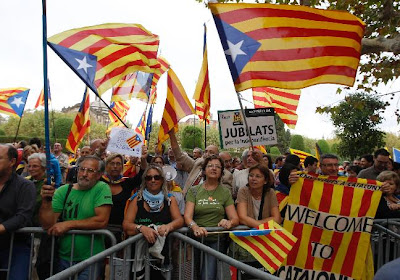 |
| Andorra’s prime minister, Antoni Martí, appearing in Andorra this week with the U.N. secretary general, Ban Ki-Moon, and their respective flags. |
Ban’s comments came during an official state visit to the Principality of Andorra, a mountainous city-state along the border between Spain and France. The official language of Andorra is Catalan, though it is only spoken by 39% of its 85,000 or so residents. Another 35% speak (other) varieties of Spanish. The heartland of the Catalan nation is the Autonomous Community of Catalonia, Spain’s northeasternmost region, where Catalan is a co-official language, but a minority also speaks it in southeastern France, where the central government refuses to grant any minority languages any kind of official status. Andorra joined the U.N. only in 1993, becoming the world body’s third-smallest member-state, behind Liechtenstein and San Marino, though since 1971 its official anthem has been the “Hymn of the United Nations,” composed by the legendary Catalan violincellist Pablo Casals—who gave a fiery speech on Catalan identity on the occasion of the anthem’s adoption.
 |
| The Catalan-speaking lands |
 |
| Ban Ki-Moon at a Real Madrid soccer match earlier this year |
Separatism, as we can already see, is a can of worms, and Ban may regret opening it. But for now, Catalans are applauding him.
[You can read more about Catalonia and many other sovereignty and independence movements both famous and obscure in my new book, a sort of encyclopedic atlas just published by Litwin Books under the title Let’s Split! A Complete Guide to Separatist Movements and Aspirant Nations, from Abkhazia to Zanzibar. The book, which contains 46 maps and 554 flags (or, more accurately, 554 flag images), is available for order now on Amazon. Meanwhile, please “like” the book (even if you haven’t read it yet) on Facebook and see this interview for more information on the book.]


No comments:
Post a Comment